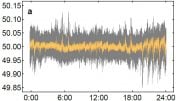
Engaging in 30 to 60 minutes of muscle-strengthening activity weekly is associated with a 10-20% reduced risk of death from all causes.
Lower risk of death from all causes and from cardiovascular disease, diabetes, and cancer, in particular. But no conclusive evidence that more than an hour of this activity is more effective.
Between 30 and 60 minutes of muscle-strengthening activity every week is linked to a 10-20% lower risk of death from all causes, and from cardiovascular disease, diabetes, and cancer, in particular, finds a pooled data analysis of the available evidence, published online in the British Journal of Sports Medicine.
The findings are independent of aerobic exercise. But the analysis points to a J-shaped curve for most outcomes, with no conclusive evidence that more than an hour a week of muscle-strengthening activity reduces the risk further still.
Physical activity guidelines recommend regular muscle-strengthening activities for adults, primarily because of the known benefits for skeletal muscle health. Examples of these activities include lifting weights; working with resistance bands; push-ups, sit-ups, and squats; and heavy gardening, such as digging and shoveling.
Previous research indicates that muscle-strengthening activity is associated with a lower risk of death, but it’s not known what the optimal ‘dose’ might be.
To try and find out, the researchers scoured research databases for relevant prospective observational studies that included adults without major health issues who had been monitored for at least 2 years.
The final analysis included 16 studies out of an initial cache of 29. The earliest study was published in 2012, and most studies were carried out in the USA, with the rest from England, Scotland, Australia, and Japan. The maximum monitoring period lasted 25 years.
Study participant numbers varied from nearly 4000 to almost 480,000, and ranged in age from 18 to 97. Twelve studies included both men and women; two included men only while three included women only. All the studies considered aerobic or other types of physical activity as well as muscle-strengthening activities.
The pooled data analysis showed that muscle-strengthening activities were associated with a 10–17% lower risk of death from any cause, as well as death from heart disease and stroke, cancer, diabetes, and lung cancer.
No association was found between muscle strengthening and a reduced risk of specific types of cancer, including those of the bowel, kidney, bladder, or pancreas.
A J-shaped curve emerged, with a maximum risk reduction of between 10–20% at approximately 30–60 minutes/week of muscle-strengthening activities for death from any cause, cardiovascular disease, and all cancer.
An L-shaped association was observed for diabetes, with a large risk reduction up to 60 minutes/week of muscle-strengthening activities, after which there was a gradual tapering off.
Joint analysis of muscle strengthening and aerobic activities showed that the reduction in risk of death from any cause, cardiovascular disease, and cancer was even greater when these two types of activities were combined: 40%, 46%, and 28% lower, respectively.
The researchers acknowledge certain limitations to their findings, the main one of which was that data from only a few studies were pooled for each of the outcomes studied. The included studies also relied on subjective assessment of muscle-strengthening activities.
Because most of the studies were carried out in the US, the results might not be more widely applicable, caution the researchers, who add that the included studies were all observational rather than clinical trials.
Given the J-shaped associations, the potential of a higher volume of muscle-strengthening activities on the reduction in risk of death is unclear, they write.
But they conclude: “The combination of muscle strengthening and aerobic activities may provide a greater benefit for reducing all-cause, [cardiovascular disease], and total cancer mortality.
“Given that the available data are limited, further studies—such as studies focusing on a more diverse population—are needed to increase the certainty of the evidence.”
Reference: “Muscle-strengthening activities are associated with lower risk and mortality in major non-communicable diseases: a systematic review and meta-analysis of cohort studies” by Haruki Momma, Ryoko Kawakami, Takanori Honda and Susumu S Sawada, 28 February 2022, British Journal of Sports Medicine.
DOI: 10.1136/bjsports-2021-105061
Funding: Ministry of Health, Labour and Welfare (MHLW) Programme









It’s probable that weight lifters generally have a more healthy lifestyle. This proves nothing. If you took a random population and had half of them start lifting weights, that might prove something.
If the earliest study considered was done in 2012, how can the “maximum monitoring period” have lasted 25 years? Does that mean some of the studies considered are ongoing, and the 25 year period is aspirational?
I see, the earliest study was PUBLISHED in 2012. My error.
So many if these articles use percentages. It would be better to give actual numbers. If there is a two in one hundred chance of a result and some activity cuts it to one in a hundred, it sounds like not a big deal, but if they state it as “cuts it by fifty percent,” it becomes a huge deal. There is not a lot of difference between ninety-eight per hundred and ninety nine per hundred, but stated as a percent there is a huge difference between one and two. I am not a statistician, ao please correct me if I am wrong.
There is always a 100% chance of death. That is an absolute certainty.
good for all to remember that if you live long enough, it will kill you
You people are idiots. It’s not hte muscle strengthening that does it. It’s that flexing your muscles is what pumps the lymphatic system.
Now will you High School journalists
GO BACK TO SCHOOL AND LEARN SOMETHIGN AND STOP SPREADING YOUR STUPIDITY